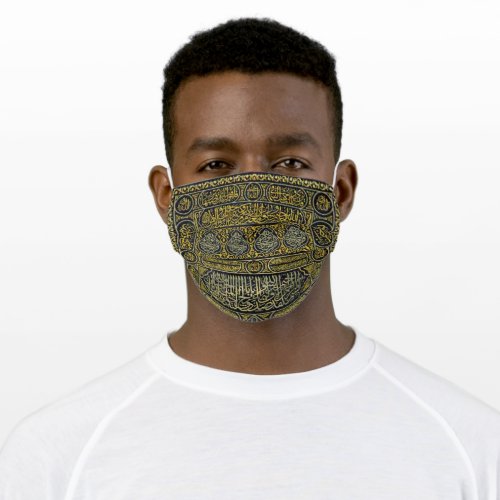Islam Islamic Hajj Eid al Fitr Adha Mubarak Arabic Adult Cloth Face Mask



Islam is a verbal noun originating from the triliteral root s-l-m which forms a large class of words mostly relating to concepts of wholeness, safeness and peace. In a religious context it means "voluntary submission to God". Muslim, the word for an adherent of Islam, is the active participle of the same verb of which Islām is the infinitive. Believers demonstrate submission to God by serving God, following his commands, and rejecting polytheism. The word sometimes has distinct connotations in its various occurrences in the Qur'an. In some verses, there is stress on the quality of Islam as an internal conviction: "Whomsoever God desires to guide, He expands his breast to Islam." Other verses connect islām and dīn (usually translated as "religion"): "Today, I have perfected your religion (dīn) for you; I have completed My blessing upon you; I have approved Islam for your religion." Still others describe Islam as an action of returning to God—more than just a verbal affirmation of faith. In the Hadith of Gabriel, islām is presented as one part of a triad that includes imān (faith), and ihsān (excellence), where islām is defined theologically as Tawhid, historically by asserting that Muhammad is messenger of God, and doctrinally by mandating five basic and fundamental pillars of practice. Islam's most fundamental concept is a rigorous monotheism, called tawhīd (Arabic: توحيد). God is described in chapter 112 of the Qur'an as: "Say: He is God, the One and Only; God, the Eternal, Absolute; He begetteth not, nor is He begotten; And there is none like unto Him."(112:1-4) Muslims and Jews repudiate the Christian doctrine of the Trinity and divinity of Jesus, comparing it to polytheism. In Islam, God is beyond all comprehension and Muslims are not expected to visualize God. God is described and referred to by certain names or attributes, the most common being Al-Rahmān, meaning "The Compassionate" and Al-Rahīm, meaning "The Merciful." Muslims believe that the creation of everything in the universe was brought into being by God’s sheer command, “‘Be’ and so it is,” and that the purpose of existence is to worship God. He is viewed as a personal god who responds whenever a person in need or distress calls him. There are no intermediaries, such as clergy, to contact God who states, "I am nearer to him than (his) jugular vein." The reciprocal nature is mentioned in the hadith qudsi, "I am as My servant thinks (expects) I am. Allāh is the term with no plural or gender used by Muslims and Arabic-speaking Christians and Jews to reference God, while ʾilāh (Arabic: إله) is the term used for a deity or a god in general. Other non-Arab Muslims might use different names as much as Allah, for instance "Tanrı" in Turkish, "Khodā" in Persian or Xudā in Urdu. Muslims identify the prophets of Islam (Arabic: أنۢبياء anbiyāʾ ) as those humans chosen by God to be his messengers. According to the Qurʼan, the prophet were instructed by God to bring the "will of God" to the peoples of the nations. Muslims believe that prophets are human and not divine, though some are able to perform miracles to prove their claim. Islamic theology says that all of God's messengers preached the message of Islam—submission to the will of God. The Qurʼan mentions the names of numerous figures considered prophets in Islam, including Adam, Noah, Abraham, Moses and Jesus, among others. Muslims believe that God finally sent Muhammad (Seal of the Prophets) to convey the divine message to the whole world (to sum up and to finalize the word of God). The Kaaba (Arabic: الكعبة al-Kaʿbah, "The Cube"), also known as al-Kaʿbah l-Mušarrafah (الكعبة المشرفة; "The Noble Cube"), al-Baytu l-ʿAtīq (البيت العتيق; "The Primordial House"), or al-Baytu l-Ḥarām (البيت الحرام; "The Sacred/Forbidden House") is a cuboid building in Mecca, Saudi Arabia, and is one of the most sacred sites in Islam. Masjid al-Haram, the most sacred mosque (masjid) in Islam, is built around the Kaaba. Muslims are expected to face the Kaaba during prayers, no matter where they are. From any given point in the world, the direction facing the Kaaba is called the Qiblah. One of the Five Pillars of Islam requires every Muslim to perform the Hajj pilgrimage at least once in his or her lifetime if able to do so. Multiple parts of the Hajj require pilgrims to walk seven times around the Kaaba in a counter-clockwise direction. [courtesy wikipedia] Islam Islamic Muslim Hajj Eid Mubarak Fitr Adha Lebaran "Hari Raya Puasa" Ramadan "Hari Raya Aidilfitri" "Idul Fitri" "Eid al Fitr" "Eid al Adha" "Eid Mubarak" Mecca pilgrimmage istita'ah mustati "Dhu al-Hijjah" Prophet Muhammad Ka'aba calligraphy sura blessing prayer compassionate merciful Allah suni sunni shia shiite


